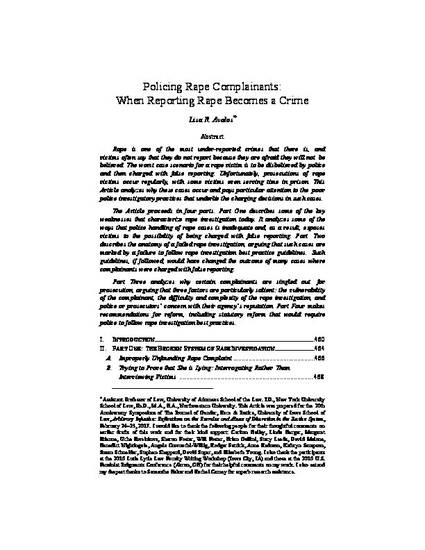
Article
Policing Rape Complainants: When Reporting Rape Becomes a Crime
Journal of Gender, Race and Justice
(2017)
Abstract
Rape is one of the most under-reported crimes that there is, and victims often say that they do not report because they are afraid they will not be believed. The worst case scenario for a rape victim is to be disbelieved by police and then charged with false reporting. Unfortunately, prosecutions of rape victims occur regularly, with some victims even serving time in prison.This Article analyzes why these cases occur and pays particular attention to the poor police investigatory practices that underlie the charging decisions in such cases.
The Article proceeds in four parts. Part One describes some of the key weaknesses that characterize rape investigation today. It analyzes some of the ways that police handling of rape cases is inadequate and, as a result, exposes victims to the possibility of being charged with false reporting.
Part Two describes the anatomy of a failed rape investigation, arguing that such cases are marked by a failure to follow rape investigation best practice guidelines. Such guidelines,if followed, would have changed the outcome of many cases where complainants were charged with false reporting.
Part Three analyzes why certain complainants are singled out for prosecution, arguing that three factors are particularly salient: the vulnerability of the complainant,the difficulty and complexity of the rape investigation,and police or prosecutors’ concern with their agency’s reputation.
Part Four makes recommendations for reform, including statutory reform that would require police to follow rape investigation best practices.
Keywords
- rape,
- sexual assault,
- human rights,
- international,
- comparative,
- false reports,
- discrimination,
- criminal law,
- women's rights
Disciplines
Publication Date
Spring May 5, 2017
Citation Information
Lisa Avalos. "Policing Rape Complainants: When Reporting Rape Becomes a Crime" Journal of Gender, Race and Justice Vol. 20 (2017) p. 459 - 508 Available at: http://works.bepress.com/lisa_avalos/2/
